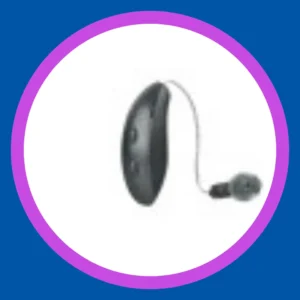Frequently Asked Questions About Hearing Loss
Hearing loss affects millions and can impact daily life in many ways. This guide answers the most common questions about hearing loss. If you’re wondering about symptoms, causes, treatment options, or hearing aids, we’ve got you covered.
Let’s explore the most important FAQs about hearing loss and how your hearing care provider can help.
How Do I Know if I Have Hearing Loss?
Hearing loss may develop so slowly you don’t notice it right away. Common signs include:
- Asking others to repeat themselves often
- Difficulty hearing in crowds or noisy places
- Turning the TV volume up higher than others prefer
- Thinking people mumble or don’t speak clearly
- Feeling tired after long conversations
Even mild symptoms deserve attention. Early treatment can improve communication and prevent further challenges.

What Are the Early Signs of Hearing Loss?
Early signs often include subtle difficulties in conversation. Look for these indicators:
- Struggling to understand speech in noisy environments
- Trouble distinguishing consonants like “s,” “f,” and “th”
- Fatigue or frustration after socializing
- Ringing or buzzing in the ears (tinnitus)
Recognizing early signs can help prevent future complications.
Discover whether you need a hearing aid for mild hearing loss.
Could I Have Hearing Loss If My Doctor Hasn’t Mentioned It?
Yes. Many primary care providers don’t routinely check for hearing loss. Hearing loss often develops gradually and goes unnoticed in standard checkups. A full hearing evaluation is the best way to know for sure.
Find out why hearing loss is increasing in millennials and Gen Z.
What Does Hearing Loss Sound Like?
People describe hearing loss as:
- Muffled or distorted speech
- Trouble hearing high-pitched sounds
- Difficulty separating voices from background noise
- Needing to concentrate hard to follow conversations
If any of this sounds familiar, it’s time to schedule a hearing evaluation.
What Causes Hearing Loss?
Hearing loss has many causes, including:
- Aging (presbycusis)
- Prolonged noise exposure
- Ear infections or trauma
- Genetic conditions
- Ototoxic medications
- Medical conditions like Meniere’s disease
Understanding the cause helps guide treatment and prevention.
Are There Different Types of Hearing Loss?
Yes, there are four main types:
- Sensorineural – Damage to the inner ear or auditory nerve
- Conductive – Issues in the outer or middle ear
- Mixed – A combination of sensorineural and conductive loss
- Auditory Neuropathy Spectrum Disorder – A rare type that disrupts sound processing in the brain
Each type requires a unique care plan.
Can Hearing Loss Be Prevented?
Some types can be. To reduce your risk:
- Use hearing protection in loud environments
- Avoid inserting objects into your ears
- Manage chronic health conditions
- Turn down the volume on headphones
- Avoid ototoxic medications when possible
Taking care today protects your hearing tomorrow.
Can Hearing Loss Be Reversed?
It depends on the cause:
- Reversible: earwax buildup, infections, fluid in the ear
- Usually permanent: age-related or noise-induced damage
A hearing care provider can determine if your hearing damage can be reversed. .
Understand whether ear candling can help.

What Are the Treatment Options for Hearing Loss?
Treatment depends on the type and severity of hearing loss:
- Hearing aids for most sensorineural losses
- Cochlear implants for profound loss
- Surgery for specific middle ear conditions
- Assistive listening devices (ALDs) for added support
Every treatment plan is customized for your needs.
Will Hearing Aids Restore Normal Hearing?
No. Hearing aids amplify sound but do not cure hearing loss. They improve sound clarity and speech understanding, especially in noisy environments.
Do I Need a Hearing Aid in Each Ear?
Yes, if you have hearing loss in both ears. Two aids improve:
- Sound localization
- Balance and orientation
- Speech clarity in background noise
- Overall hearing comfort
Your brain processes sound better with both ears working together.
What Is It Like to Hear Through a Hearing Aid?
At first, sounds may seem strange or overly sharp. With consistent use, your brain adjusts. Soon, speech and background sounds feel more natural.
How Do I Know If I Need Hearing Aids?
You may need hearing aids if you:
- Struggle to hear conversations
- Turn the TV volume up too high
- Feel isolated in group settings
- Avoid noisy places
- Miss out on environmental sounds
A hearing test confirms the need for amplification.
Will Wearing Hearing Aids Make Me Look Old?
Not at all. Today’s hearing aids are sleek, discreet, and often invisible. Untreated hearing loss is more noticeable than modern hearing aids.
How Long Will My Hearing Aids Last?
Most hearing aids last five to seven years.
Lifespan depends on:
- Usage
- Maintenance
- Model and manufacturer
Routine care extends device life.
How Much Do Hearing Aids Cost?
Costs vary depending on:
- Technology
- Features
- Style
- Brand
Some insurance plans help cover the cost. Ask your provider for details.
Find out more about hearing aid costs.
What Is Tinnitus?
Tinnitus is the perception of sound when no external sound exists. It often sounds like ringing, buzzing, or clicking. Tinnitus frequently accompanies hearing loss. Hearing aids can help reduce tinnitus perception by amplifying background sound.
Explore using your diet to lower tinnitus risk.
Can Hearing Loss Increase My Risk of Dementia?
Studies show a strong link between untreated hearing loss and cognitive decline. Using hearing aids helps keep your brain active and engaged.
Learn more about hearing loss and dementia.

What Is an Audiological Evaluation?
A hearing evaluation includes:
- Visual ear inspection
- Tone and speech testing
- Determining hearing thresholds
- Identifying the type and degree of hearing loss
- Recommending next steps
Evaluations are painless and essential for accurate diagnosis.
What Are the Degrees of Hearing Loss?
Hearing loss is measured in decibels (dB):
- Normal: 0–25 dB
- Mild: 26–40 dB
- Moderate: 41–70 dB
- Severe: 71–90 dB
- Profound: Over 91 dB
Degrees determine the best treatment plan.
What Kinds of Hearing Aids Are Available?
Several styles exist:
- Behind-the-ear (BTE)
- In-the-ear (ITE)
- In-the-canal (ITC)
- Completely-in-canal (CIC)
- Invisible-in-canal (IIC)
Your hearing care provider will recommend the best option for your needs.
What Is a Cochlear Implant?
A cochlear implant is a surgically implanted device that bypasses damaged inner ear structures. It helps people with profound hearing loss who receive limited benefit from hearing aids.
What Are Assistive Listening Devices?
ALDs help people hear better in challenging settings. Common ALDs include:
- TV amplifiers
- FM systems
- Captioned phones
- Personal microphones
- Vibrating alarm clocks
These tools work with or without hearing aids.
What Happens If I Delay Hearing Treatment?
Waiting can cause serious consequences:
- Social withdrawal
- Increased risk of depression and anxiety
- Faster cognitive decline
- Strained relationships
Early treatment leads to better outcomes and an improved quality of life.
Contact Stanford Hearing Today
If you found this list of FAQs about hearing loss helpful, don’t wait to take the next step.
Stanford Hearing offers comprehensive hearing evaluations and solutions tailored to your needs.
Call today to schedule an appointment. Reconnect with the world around you.
